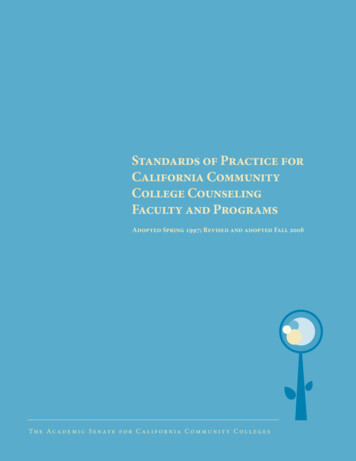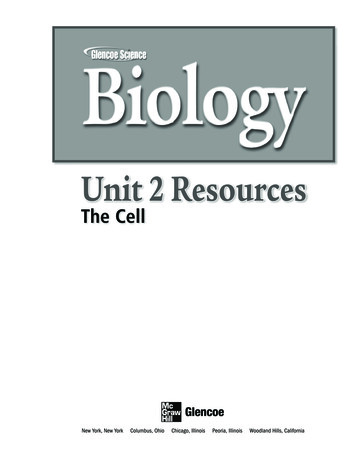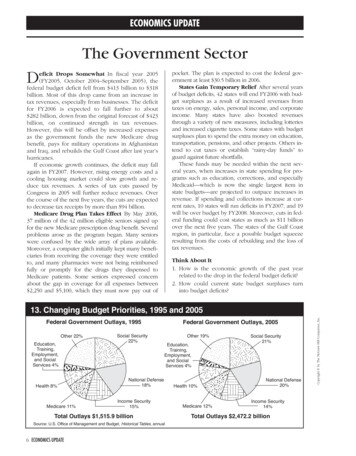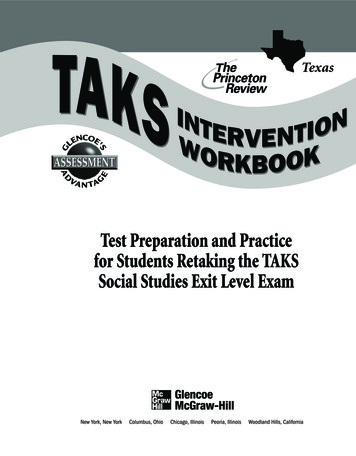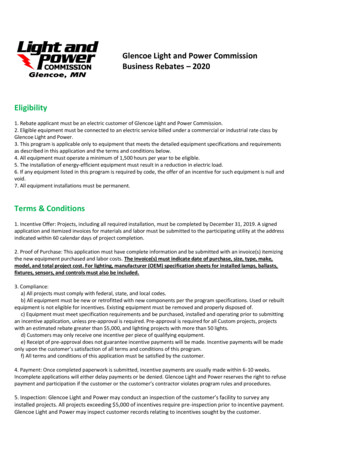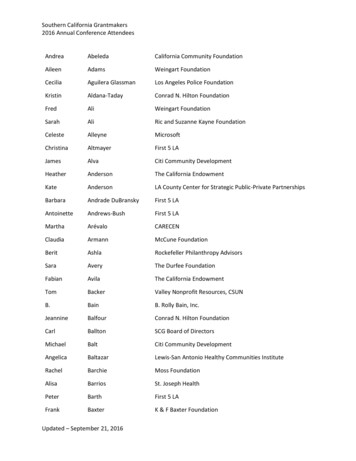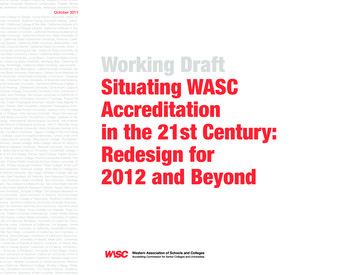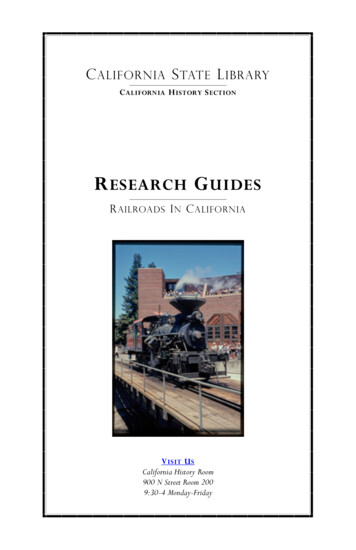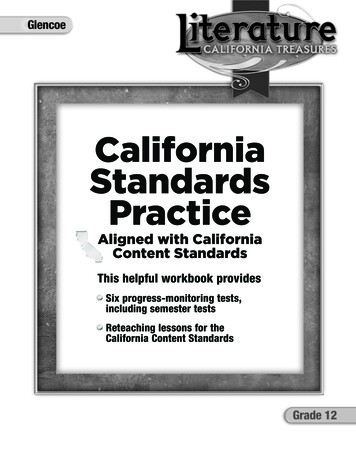
Transcription
CaliforniaStandardsPracticeAligned with CaliforniaContent StandardsThis helpful workbook providesSix progress-monitoring tests,including semester testsReteaching lessons for theCalifornia Content Standards
Copyright by The McGraw-Hill Companies, Inc. All rights reserved. Except as permittedunder the United States Copyright Act, no part of this publication may be reproduced ordistributed in any form or by any means, or stored in a database or retrieval system, withoutprior permission of the publisher.Send all inquiries to:Glencoe/McGraw-Hill8787 Orion PlaceColumbus, OH 43240-4027ISBN: 978-0-07-890322-9MHID: 0-07-890322-XPrinted in the United States of America.1 2 3 4 5 6 7 8 9 10 045 12 11 10 09 08
TABLE OF CONTENTSUnit 1 AssessmentsReading/Literature. . . . . . . . . . . . . . . . . . . . . . . . . . . . . . . . . . . . . . . . . . . . . . . . . . . . 2Unit 2 AssessmentsReading/Literature. . . . . . . . . . . . . . . . . . . . . . . . . . . . . . . . . . . . . . . . . . . . . . . . . . . 16Unit 3/Semester AssessmentsReading/Literature. . . . . . . . . . . . . . . . . . . . . . . . . . . . . . . . . . . . . . . . . . . . . . . . . . . 32Writing Applications. . . . . . . . . . . . . . . . . . . . . . . . . . . . . . . . . . . . . . . . . . . . . . . . . . 47Unit 4 AssessmentsReading/Literature. . . . . . . . . . . . . . . . . . . . . . . . . . . . . . . . . . . . . . . . . . . . . . . . . . . 50Unit 5 AssessmentsReading/Literature. . . . . . . . . . . . . . . . . . . . . . . . . . . . . . . . . . . . . . . . . . . . . . . . . . . 64Unit 6 AssessmentsReading/Literature. . . . . . . . . . . . . . . . . . . . . . . . . . . . . . . . . . . . . . . . . . . . . . . . . . . 78Unit 7/Semester AssessmentsReading/Literature. . . . . . . . . . . . . . . . . . . . . . . . . . . . . . . . . . . . . . . . . . . . . . . . . . . 94Writing Applications. . . . . . . . . . . . . . . . . . . . . . . . . . . . . . . . . . . . . . . . . . . . . . . . . 108Copyright Glencoe/McGraw-Hill, a division of The McGraw-Hill Companies, Inc.Reteach Lessons . . . . . . . . . . . . . . . . . . . . . . . . . . . . . . . . . . . . . . . . . . . . . . . . . . . . 112iii
Unit 1 AssessmentReading/Literature
G R A D E12Reading/LiteratureUnit 1 TestContentmentBy Oliver Wendell Holmes“Man wants but little here below.”5101515 30Plain food is quite enough for me;Three courses are as good as ten;—If Nature can subsist on three,Thank Heaven for three. Amen!I always thought cold victual nice;—My choice would be vanilla-ice.I care not much for gold or land;—Give me a mortgage here and there,—Some good bank-stock, some note of hand,Or trifling railroad share,—I only ask that Fortune sendA little more than I shall spend.Honors are silly toys, I know,And titles are but empty names;I would, perhaps, be Plenipo,1—But only near St. James;2I’m very sure I should not careTo fill our Gubernator’s chair.Jewels are baubles; ’t is a sinTo care for such unfruitful things;—One good-sized diamond in a pin,—Some, not so large, in rings,—A ruby, and a pearl, or so,Will do for me;—I laugh at show.My dame should dress in cheap attire;(Good, heavy silks are never dear;)—I own perhaps I might desire21.Plenipo: Plenipotentiary. A diplomat with full power to negotiate with other countries.2.St. James: The Court of St. James, where foreign diplomats are accredited.California Standards Practice, Grade 12Copyright by The McGraw-Hill Companies, Inc.25Little I ask; my wants are few;I only wish a hut of stone,(A very plain brown stone will do,)That I may call my own;And close at hand is such a one,In yonder street that fronts the sun.
G R A D EReading/LiteratureUnit 1 Test35404550Copyright by The McGraw-Hill Companies, Inc.5560657012Some shawls of true Cashmere,—Some marrowy crapes of China silk,Like wrinkled skins on scalded milk.I would not have the horse I driveSo fast that folks must stop and stare;An easy gait—two forty-five—Suits me; I do not care;—Perhaps, for just a single spurt,Some seconds less would do no hurt.Of pictures, I should like to ownTitians3 and Raphaels4 three or four,—I love so much their style and tone,One Turner, and no more,(A landscape,—foreground golden dirt,—The sunshine painted with a squirt.)Of books but few,—some fifty scoreFor daily use, and bound for wear;The rest upon an upper floor;—Some little luxury thereOf red morocco’s gilded gleamAnd vellum rich as country cream.Busts, cameos, gems,—such things as these,Which others often show for pride,I value for their power to please,And selfish churls deride;—One Stradivarius, I confess,Two Meerschaums, I would fain possess.Wealth’s wasteful tricks I will not learn,Nor ape the glittering upstart fool;—Shall not carved tables serve my turn,But all must be of buhl?Give grasping pomp its double share,—I ask but one recumbent chair.Thus humble let me live and die,Nor long for Midas’ golden touch;If Heaven more generous gifts deny,I shall not miss them much,—Too grateful for the blessing lentOf simple tastes and mind content!3.Titians: Paintings by Tiziano Vecellio (1488–1576).4.Raphaels: Paintings by Raffaello Sancio (1483–1520).Unit 1 Test, Reading/Literature3
G R A D E1212Reading/LiteratureHolmes opens his poem witha quotation: “Man wants butlittle here below.” Given thecharacter of the poem’s speaker,which of the following would bea more accurate way to begin?3Which philosophical point doesHolmes make in the poem?AHumility is a naturalcharacteristic of humanity.BThose who are greedy arelikely to suffer hardships.AMan claims to want littlehere below.CIt is difficult to be contentedin a wealthy society.BMan earns but little here onEarth.DPeople should give up theircomforts and live simply.CMan wants but little whilehe’s young.DMan hopes to earn what hedeserves.Read lines 26–31 from the poem.These lines are ironic becausetheir speakerApossesses few jewels and doesnot want any more.Bthinks that materialpossessions such as jewels arebad.Cis discontented with the littlewealth that he owns.Dclaims that jewels are sinfulbut still desires them.California Standards Practice, Grade 12Copyright by The McGraw-Hill Companies, Inc.Jewels are baubles; ’t is a sinTo care for such unfruitfulthings;—One good-sized diamond in apin,—Some, not so large, in rings,—A ruby, and a pearl, or so,Will do for me;—I laugh at show.4Unit 1 Test
G R A D EReading/LiteratureUnit 1 TestThe following items are notbased on a passage. Read andanswer each question.45Copyright by The McGraw-Hill Companies, Inc.67Read this sentence.The club was organized intoseveral comittees and all themembers were assigned tospecific tasks.Which term refers to the fear obiaThe relationship between foaland horse is the same as therelationship betweenAgoose and gander.Bpollen and bumblebee.Ctrunk and elephant.Dtadpole and frog.12Which underlined word isspelled The relationship between sadand miserable is the same as therelationship between worriedandAirate.Bdistraught.Cgrave.Dreckless.Unit 1 Test, Reading/Literature5
G R A D E12Reading/LiteratureUnit 1 TestFrom John BullBy Washington IrvingThere is no species of humor in which the English more excel, than that whichconsists in caricaturing and giving ludicrous appellations, or nicknames. In thisway they have whimsically designated, not merely individuals, but nations;and, in their fondness for pushing a joke, they have not spared even themselves.One would think that, in personifying itself, a nation would be apt to picturesomething grand, heroic and imposing, but it is characteristic of the peculiarhumor of the English, and of their love for what is blunt, comic, and familiar, thatthey have embodied their national oddities in the figure of a sturdy, corpulent1old fellow, with a three-cornered hat, red waistcoat, leather breeches, and stoutoaken cudgel.2 Thus they have taken a singular delight in exhibiting their mostprivate foibles in a laughable point of view; and have been so successful in theirdelineations, that there is scarcely a being in actual existence more absolutelypresent to the public mind than that eccentric personage, John Bull. . . .2Unluckily, they sometimes make their boasted Bull-ism an apology for theirprejudice or grossness; and this I have especially noticed among those trulyhomebred and genuine sons of the soil who have never migrated beyond thesound of Bow-bells. If one of these should be a little uncouth in speech, and aptto utter impertinent truths, he confesses that he is a real John Bull, and alwaysspeaks his mind. If he now and then flies into an unreasonable burst of passionabout trifles, he observes, that John Bull is a choleric old blade, but then hispassion is over in a moment, and he bears no malice. If he betrays a coarsenessof taste, and an insensibility to foreign refinements, he thanks heaven for hisignorance—he is a plain John Bull, and has no relish for frippery3 and nicknacks.His very proneness to be gulled4 by strangers, and to pay extravagantly forabsurdities, is excused under the plea of munificence5—for John is always moregenerous than wise.3Thus, under the name of John Bull, he will contrive to argue every fault into amerit, and will frankly convict himself of being the honestest fellow in existence.4However little, therefore, the character may have suited in the firstinstance, it has gradually adapted itself to the nation, or rather they haveadapted themselves to each other; and a stranger who wishes to study Englishpeculiarities, may gather much valuable information from the innumerableportraits of John Bull, as exhibited in the windows of the caricature-shops.61.corpulent: fat or fleshy.2.cudgel: short, thick club.3.frippery: cheap, showy clothes or ornaments.4.gulled: deceived or cheated.5.munificence: lavish generosity.California Standards Practice, Grade 12Copyright by The McGraw-Hill Companies, Inc.1
G R A D EReading/LiteratureUnit 1 Test89Copyright by The McGraw-Hill Companies, Inc.1011To which literary subgenreis this passage most closelyrelated?1212The theme of this passage dealsmainly with theAdecline in popularity of JohnBull.tragedyBsuccess of English literature.CpastoralCDparodydiscontent with governmentpolicies.Dpeculiarity of the Englishpeople.AsatireBAccording to the author,the persona of John BullrepresentsAintellect and wealth.Bbrashness and naiveté.Cmalice and impatience.Dwit and cleverness.The passage’s tone can best bedescribed as13Read this sentence from theessay.Thus, under the name of JohnBull, he will contrive to argueevery fault into a merit, andwill frankly convict himself ofbeing the honestest fellow inexistence.Alighthearted.What does the author suggestin this sentence?Bominous.ACsolemn.Dangry.Those who call themselvesJohn Bull are usually thetrustworthiest people.BJohn Bull is an upstandingand honest person who doesnot make mistakes.CPeople will often use the JohnBull persona to explain awaybad behavior.DThe English tradition of JohnBull no longer has a place insociety.The author suggests which ofthe following archetypes in hisdescription of John Bull?Atragic heroBscientistCfoolDtricksterUnit 1 Test, Reading/Literature7
G R A D E12Reading/LiteratureUnit 1 TestThe following is a rough draft of a student essay. It may contain errors.Benjamin Franklin and Electricity(1) In 1857 Benjamin Franklin made a remarkable discovery that would changepeople’s lives forever. (2) Franklin had often marveled at the awesome naturalwonder of lightning. (3) He thought it, if only someone could figure out how tocontrol it, could benefit people in some way.(4) Franklin believed that lightning was a natural form of electricity, but heneeded to test this theory. (5) He thought that metal would conduct lightning iflightning was a form of electricity. (6) So, using his keen intellect, he devised anexperiment. (7) One stormy night, Franklin tied a brass key to the string of akite and sent the kite soaring into the sky. (8) When a bolt of lightning struck thekite, the lightning traveled through the brass key and through Franklin’s body,knocking him to the ground. (9) Fortunately, Franklin was not hurt and was ableto prove the validity of his theory. (10) Most important of all, Franklin’s courageousexperiment made inventors more aware of the power and potential of electricity.Copyright by The McGraw-Hill Companies, Inc.8California Standards Practice, Grade 12
G R A D EReading/LiteratureUnit 1 Test14The main purpose of this essayis toAinform readers how electricitywas discovered.Bargue that BenjaminFranklin was a brilliantscientist.CD15The author uses words such as“remarkable,” “marveled,” and“awesome” in order to expressAexcitement over Franklin’sexperiment.Bexplain the importance ofelectricity to mankind.tension surrounding thedanger of the experiment.Cdescribe Franklin’sexperiment with lightning.agitation with Franklin’snear injury.Dcontemplation in writingabout Franklin’s life.Read sentence 3 from the essay.He thought it, if only someonecould figure out how to control it,could benefit people in some way.What is the best way to rewritethis sentence?Copyright by The McGraw-Hill Companies, Inc.1612AHe thought, if only someonecould figure out how to controlit, it could benefit people in someway.BHe thought lightning couldbenefit people in some way, ifonly someone could figure outhow to control it.CIf only someone could figure outhow to control it, he thought itcould benefit people in some way.DIn some way, he thoughtlightning could benefitpeople, if only someone couldfigure out how to control it.17Which sentence in the passagebest supports the idea insentence 5?Asentence 4Bsentence 6Csentence 7Dsentence 8Unit 1 Test, Reading/Literature9
G R A D E1218Reading/LiteratureWhich sentence could best beadded to the end of paragraph2 to emphasize the importanceof Benjamin Franklin’sexperiment?ABFranklin’s experiment provedto be a success; people fromall over the world marveledat his great discovery.The knowledge gained byFranklin helped lead to suchinventions as the electriclight bulb and the battery.CBenjamin Franklin is stillpopular to this day fordiscovering electricity; if itweren’t for him, we’d still beusing candles.DElectricity sparked a newway of living; it markedthe beginning of numerousindustries and alteredpeople’s lives.Unit 1 Test19Read the following sentence.He figured out a way to “catch”lightning and study it.Where is the best place to addthis sentence to the essay?Aafter sentence 3Bafter sentence 4Cafter sentence 5Dafter sentence 6Copyright by The McGraw-Hill Companies, Inc.10California Standards Practice, Grade 12
G R A D EUnit 1 TestReading/Literature12Copyright by The McGraw-Hill Companies, Inc.Artificial Intelligence Research1Artificial Intelligence (AI) is the use of computer programs to mimic the wayhumans reason and learn. The goal of AI is to produce programs that resembleregular human thought processes. Current research in AI is concentrated in threemain areas: problem solving, pattern recognition, and game playing.2In solving problems, humans move from an “initial state” to a “goal state” througha finite number of steps that carry them through to a conclusion. A Euclideangeometrical proof is a good example of this type of thinking. Although computersare well suited to mimicking purely logical processes, humans do not always solveproblems in a purely logical fashion. AI research is therefore also attempting toconstruct models of reasoning processes that are based on intuition and guesswork.3Pattern recognition involves identifying and classifying forms, shapes, orrelationships among data. The difficulty for AI research in this area is similarto the obstacles to building models of nonlogical problem-solving methods.Because many classification situations involve overlapping categories, theproblem of pattern recognition is not merely one of being able to tell a circle froma square. For example, should an orange be classified in the same category assteak, since both are foods? Or should they be put in the separate categories offruit and meat? The answer depends on the context of the decision. A situationinvolving only foods might dictate separating the orange and the steak, whereasa classification situation in the broader world of objects might entail putting thetwo foods together in the same group. While analyzing context is often a simplematter for humans, it is extremely difficult to mimic with a machine.4Natural language processing is another form of pattern recognition that posesdifficulties for AI researchers. Humans have little difficulty dealing with thevaried forms of expression used in natural languages such as English. It is notdifficult for either a machine or a person to understand the sentence “The car isbig.” But while English speakers might successfully unravel the classic example“Throw momma from the train a kiss” into the more easily comprehended “Throwa kiss to momma from the train,” this type of translation is more difficult for amachine to make. AI research attempts to model the learning process used byhumans in making such a translation.5The greatest strides in AI research have been in the area of game playing. Inthis area, possible moves are analyzed by the computer to maximize its chancesof winning. While this may seem like a purely logical process, the success of AIprograms in outsmarting human competitors, who do not always use pure logic,is a measure of the progress of attaining intelligence artificially. If a machinecan beat a human player, then a certain amount of intelligence beyond merecomputational ability can be attributed to that machine.Unit 1 Test, Reading/Literature11
G R A D E12Reading/LiteratureUnit 1 Test6The public perception of advances in AI research is based largely on itsawareness of advances in chess-playing computers. The first significantdevelopment in the field came in 1948, when Alan Turing, a mathematician fromGreat Britain, created a chess program using a mechanical calculator. Turing’smachine was able to execute chess moves, but not adeptly; it lost to an amateurin its sole recorded game. A decade later, an American mathematician namedClaude Shannon developed two distinct chess-playing algorithms. One, usingwhat Shannon termed “brute force,” calculated all potential moves and theconsequences of those moves as far ahead as a computer’s memory would allow.The second, which Shannon called “selective mode,” appraised only moves withgreat potential for success; selective mode considered a smaller number of futureconsequences of these moves.7It was not until 1988 that a computer defeated a chess grandmaster. Inthat year, a brute force program called Hitech won a four-game match againstArnold Denker, former American chess champion. By 1990, a computer haddefeated Anatoly Karpoc, a former world champion; the German computer, calledMephisto, also used the brute force approach. Yet another brute force chessprogram, IBM’s Deep Blue, defeated world champion Gary Kasparov in onematch of a six-game match, marking the first time a computer had defeated areigning world champion. Deep Blue, using major strides in the development ofcomputer memory, evaluated every possible move and all possible positions sixmoves afterward; as a result, it evaluated over 100 billion positions for each turn.The endeavor to develop an equally powerful selective mode program—whichdevelopers agree would more closely mimic human intelligence—has been lessopportune.Copyright by The McGraw-Hill Companies, Inc.12California Standards Practice, Grade 12
G R A D EReading/LiteratureUnit 1 Test20Copyright by The McGraw-Hill Companies, Inc.2122Which of the following beststates the writer’s purpose inthis report?2312The writer’s final statement,“The endeavor to develop anequally powerful selectivemode program—whichdevelopers agree wouldmore closely mimic humaninte
This helpful workbook provides Six progress-monitoring tests, including semester tests Reteachin
